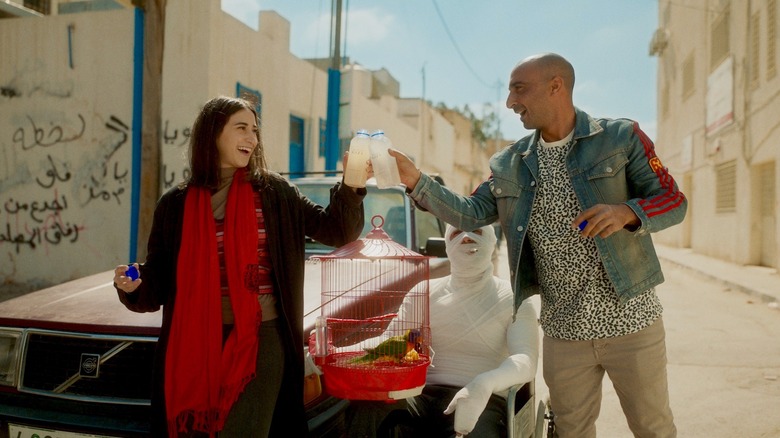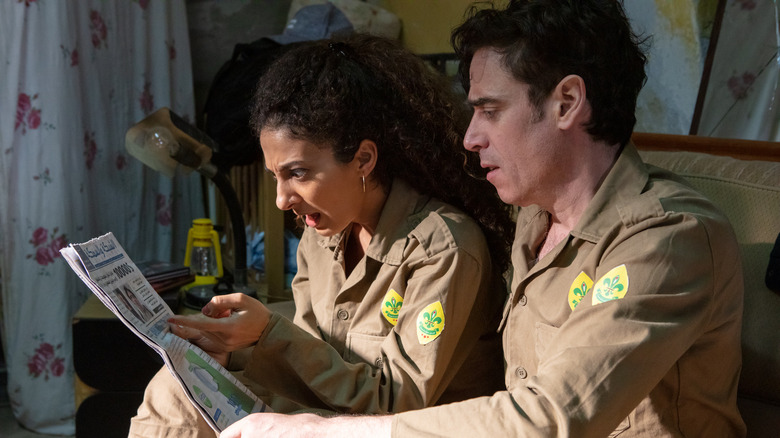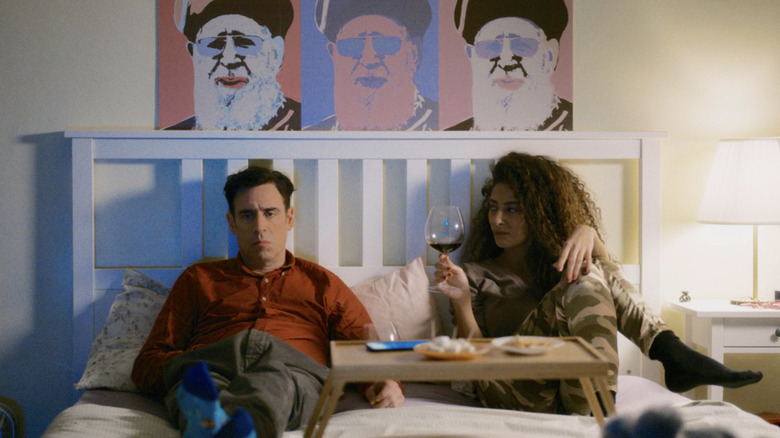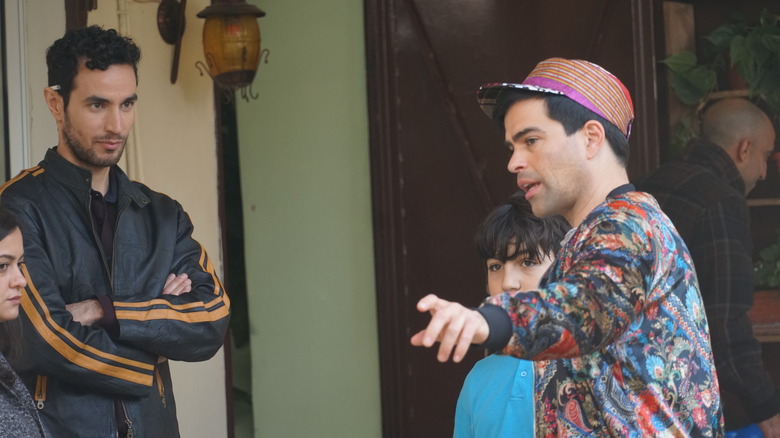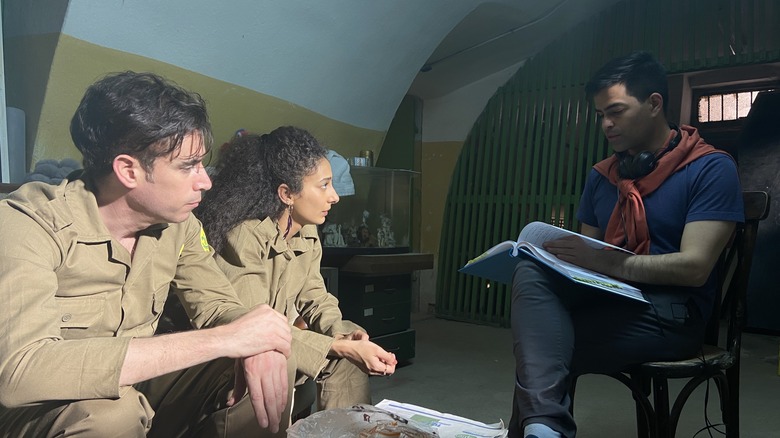British-Palestinian Filmmaker Basil Khalil Uses Humor To Understand Strife In A Gaza Weekend [Exclusive Interview]
Early into British-Palestinian filmmaker Basil Khalil's raucously subversive new satire, "A Gaza Weekend," a news anchor announces something from a rickety television set that would be absolutely unbelievable in the world of the film (or in our own): "Gaza has become the safest place on Earth."
In reality, Gaza, the tiny, densely populated strip of land bordering the Mediterranean Sea from the east has been described as an "open-air prison," subject to an illegal blockade by Israel since 2005, in which all movement is restricted, all commerce is regulated (and inflated, for Palestinians only), vital resources like energy, kerosene, and clean water are frequently and deliberately jeopardized, and the people are subject to constant bombings by Israel.
But in "A Gaza Weekend," a virulent new pandemic (the film was scripted prior to COVID), which cropped up as the result of an accident in an Israeli biomedical research lab, has made Gaza the safest place to be, by virtue of the very blockade which makes life on the ground for Palestinians so miserable and untenable. Now it is Israelis who clamor to gain entry to the strip and are held up at byzantine checkpoints, designed more for harassment than actual movement control.
This is the radical spark that drives "A Gaza Weekend," Khalil's first feature following his Oscar-nominated 2015 short, "Ave Maria." The story follows Keren (Mouna Hawa) and Michael (Stephen Mangan), an Israeli-Brit couple who almost accidentally bumble their way into Gaza via a smuggler. Hiding out in the home of Nuhad (Maria Zreik) and Waleed (Adam Bakri), they must concoct a plan to escape once Palestinian authorities learn that not only have potentially infected outsiders gained entry to Gaza, one of them is an Israeli.
Khalil navigates the whole film with a deft and cheeky lightness, achieving a laugh-out-loud comedy from equal parts cutting satire and poop jokes. I sat down with the writer/director after the film's premiere at the Toronto International Film Festival to discuss how, through humor, Khalil has found a new way of grasping the crisis that Palestinians continue to experience every day.
'It's not a high concept, arthouse, preachy film for upper middle class intellectuals'
I was at the premiere here at the festival. The crowd was so great, so reactive. How did that feel?
This is the right place to show this film, because it's a crowd pleaser. It's not a high concept, arthouse, preachy film for upper middle class intellectuals to talk about and signal their wokeness through caring about other people's misery. I would say the film tackles difficult subjects, but it's done in an approachable way and also entertains you for 90 minutes, right? It's a struggle enough getting a movie in the cinema when you're up against the streamers and big Marvel movies. But I've always wanted to entertain people, so I hope whenever people go back to the cinema, or wherever they watch it, they feel that it's not a 90 minutes wasted or a 90-minute lecture.
I was thinking while watching the film that this might be a lot of Canadians' and Americans' first introduction to Palestinian people who are not suffering and crying or militant and menacing. This might be the first time they see people in Gaza just doing their jobs, making money, laughing, raising kids.
Which is embarrassing that we have to make a movie to show normal people. But I also understand that this is the world we live in. You know, everybody's got their bubble and their life, and it's the loudest voice that gets the attention, and at the moment, we Palestinians are not the loudest voice. I was also inspired by "Get Out" and "Nope" and how they were genre, they were entertaining films, had very strong subject matter, with a very clear issue to tackle, but that wasn't what the film was all about. Like, I walked out of "Nope" just blown away by the artistry and the storytelling. People feel it, they feel when you're preaching to them, and they get that for free from the news, right?
Right. And obviously, there isn't a lack of films being made in Palestine or by Palestinians, and so often what you get is these depictions of misery and suffering. Where does that come from? Is that Western buyers only being interested in those films? Festivals not programming other kinds of films?
There are so many factors. I don't know all of them, but I do know, like I have my colleagues who make movies and some of them are cheerful and some of them are painful, and it's because the trauma hasn't ended. That's the thing about Palestine — the trauma endures. So either artists have this burning fire to share, to get people to look at the injustice that's happening — and that is valid and should happen and should be documented — and there are others, like me, who come from a mixed heritage. So my mom's English and Irish, my dad's Palestinian, and I can look at it from the outside, let's say from a Westerner's point of view, who doesn't want to go to the cinema to feel guilty. It's a very colonial mindset. Like, "We made a mess, we don't want to talk about it." But I have that privilege of being able to sort of distance myself from the weight of the baggage of the collective trauma that's still ongoing.
My co-writer [Daniel Chan] is not from there, he's Portuguese, Chinese, and British. So he was also able to tell me, "Okay, this joke or this scene or this guy is too local. Let's make it understandable. I want to get at this issue. How do we get there?" So I was able to keep the Palestinian sense of humor so that other Palestinians could laugh at it and find it funny and entertaining and see themselves in it, and a foreigner who has no idea could find another avenue and a different gag, but also understand the message.
'My Aunty does that!'
Tell me about that local humor.
You might have sensed people were giggling at things that you didn't find funny?
Totally.
Those are the nuances that everyone who was brought up there, whether it's pop culture references that they would get that you wouldn't, or just the way people talk, or breaking certain taboos. The scene with the policeman and his wife where she pinches his bum, we know that people do that, but you never see it in the media. So we found it funny, it's like, "Yeah, I know my aunty does that!" But we never see on TV. That might get me into trouble with Hamas maybe, because it's infantilizing or emasculating an officer of the law. But people are people, right?
The depiction of the Palestinian police is interesting because, like cops everywhere, they're aggressive and lawless and can be scary, but they're also bumbling and funny and just human.
The three cop characters are like three different versions of a policeman can be. Our main policeman Saleh (Adeeb Safadi), he's actually a good guy, he's not corrupt. He's actually fighting corruption, but he ends up in jail because he's not working with the system. He's like the most moral policeman ever. He's trying to stop this disease, stop people coming in, he's not taking bribes. Whereas the others, one of them's taking bribes, the other is a bit of an idiot, he got his job through nepotism, which is a big thing everywhere in the world, not just there. I look at England and what's happening there.
In terms of the humor, how did you balance the more serious political satire with the silly crowdpleaser jokes, like calling the virus ARS [pronounced "arse," and why did you strike that balance?
Those ingredients, I would say it's just exposure to watching things like that. One of my favorite movies is "The Birdcage," which has such a witty sense of humor but is so camp and so silly, and yet the dialogue in there is so sharp. Roberto Benigni is very physical, but he tackles very heavy subjects, like in "Life is Beautiful." "Jojo Rabbit" as well. It flowed very easily because I was just making something that I would have liked to watch.
But on a more conscious level I was just wanting to make whatever the situation was in, whether it's about discussing a watermelon that's just cracked open that they're eating off the floor [or something else]. That's what I would do, eat it off the floor! So you know, how would I react if I was stuck with these two idiots and they don't know what they're doing but I have no power. It's the situation that makes it funny, the lines carry different weight depending on the situation. Maybe when I'm writing honestly I just think of the worst case scenario, and try to find the humor.
It also comes back to the script. There were a ton of jokes and scenarios written into the script. Of course, most of the movie is in Arabic, but I wrote it in English, so that we could pass the funding at BFI Film Forum. The thing is, when you translate things into Arabic, it doesn't always work. So you need it to make it funny in Arabic, but still work in the scene, so that when you subtitle it later, it's funny in Arabic, and in English, and in Spanish, and in French, and in Chinese, and whatever. So in that way, it's the situations that have to be humorous.
'We don't give a f***, so long as you pay the permit fees'
What was your approach to directing your actors?
I was lucky with my actors that they would often get it in the first or second take. So I would say "Okay, let's shoot what's in the script, and if you've locked it in two takes, on the third take just go wild. I'm going to keep rolling, so just go with it." Sometimes I would take the middle bit out, and we'd start on the script and end on improvisation, and they were talking over each other. One of my biggest inspirations is "Curb Your Enthusiasm," and Woody Allen also does this, where they just write the premise of what the scene's about rather than line for line dialogue. The actors don't know what to expect, and sometimes they're actually laughing at what comes up. I like that. It feels much more natural because it's how we speak. We stutter, we pronounce things wrong, we backtrack and then say it again. I was totally open to that.
You planned to shoot the film in Haifa, right?
That's right. It all happened around COVID, so we started in Haifa, but were kicked out. We kept trying to get back, but between the quarantine orders, we couldn't pay for an entire cast to quarantine for two weeks, the airlines, and all the new variants. In the end we were like, "Okay, we can't finish in Israel. We have to choose somewhere else." We chose Jordan, so we shipped a lot of the props over and a lot of the crew and all the cast over to Jordan, to Amman. And that was exactly a year from when we shut down. So some actors were a bit more tan, some put on a bit of weight, so we had to get creative with the angles and light.
While you were shooting in Israel, did you run into any roadblocks based on the content of the film?
Oh, absolutely none.
They didn't ask to review the script for any reason?
No, I think the only thing we need is permission for was from the government's secret service. Because when we were using the port scene — the line of cars trying to get into the port in the beginning — that's a real port, there are docked military ships. So they needed to approve the script. They needed to approve personnel who were on the ground, just see if they've got any criminal background. But that's it. I mean, we had guns there. They were practically like, if you want to put a mural of Arafat, we don't give a f**k, so long as you pay the permit fees.
Jordan, on the other hand, was a bit more tightly controlled. They're paranoid about putting up flags, wearing uniforms, license plates. You need permits for all of it. It's a different system. But we still did it. Nothing really stood in the way. Jordan did have a curfew from 7 p.m. to 7 a.m., so we got special permits, but we couldn't have extras beyond that. You have to apply a month in advance with the crew members, so they could give you permits, but we didn't know who the extras were going to be then, obviously, so we couldn't do night scenes with extras. That was a bit of a challenge. But you know, it worked out. There aren't very many night scenes in the film. Some of them were filmed before, and some were after. If you notice, those ones there have no real big crowds.
'You can't just go buy a PlayStation'
We talked about it on the humor level, but on a narrative level, or within the satire, how did you balance the more irreverent aspects with the fact that conditions on the ground in Gaza are dire and inhumane. The film doesn't ignore that.
Yeah, definitely. Because you can't ignore these things, they affect everything. Like look at the power cuts that happen sporadically in the film. That's because Israel bombs the power stations and doesn't let them buy parts to fix them. They maintain a state of poverty and desperation so that the people can't think beyond their station. Israel controls the flow of kerosene for the generators. So recently, they stopped it as a revenge act. The hospitals were running out of power for the incubators and whatnot. In the last minute, they allowed it, but it was a way of asserting authority. They tend to do that whenever there's an election coming, as a way of showing off power. "Look at me, I'm defending you and bombing Gaza, even if it was unprovoked."
Waleed and Emad, two of the main Palestinian characters, they're these classic film characters, hustlers who are always onto the next scheme, trying to score a couple bucks. It is a broad type, but does it have some specificity to life in Gaza?
Yes. The fact is that in Gaza you can't just import stuff. You can't just go buy a PlayStation, you know. Everything's controlled by Israel — what's allowed in is what they feel like. And then, when you are allowed something, say you want to buy a PlayStation, you have to buy it from an Israeli supplier only. So the Israeli supplier has a monopoly, and they get to hike up the price like 10 times more over what Israelis pay. And they know people in Gaza are poor. So what would be a $500 console becomes two grand, and people can't afford that. So what you get is PlayStation cafes, where people buy three or four and then you just pay a dollar for a one hour slot or something like that.
So these guys, Waleed and Emad, they have to take advantage of stuff. Waleed has his smuggler guy, he calls him up and says "listen I need masks," and he will say "no, I'm not smuggling masks, I'm smuggling antibiotics this week." These smugglers are a lifeline, even though the name has bad connotations. But they are, they are the lifeline, they're the ones smuggling car parts for garages and medication and so on. These guys hold everything together, and they're who I made my movie about.
"A Gaza Weekend" premiered at the 2022 Toronto International Film Festival, but it doesn't have an official release date yet.
